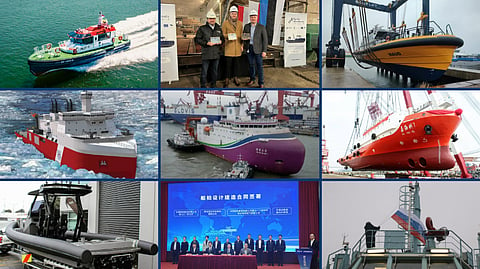Workboat News Roundup | January 7 – New Chinese research ships, hydrogen-powered RIB prototype and more
Deliveries include new pilot boats for operators in Singapore and the Netherlands, a Russian nuclear-powered icebreaker, and an archaeological research ship for a Chinese science institute. Construction meanwhile continues on new vessels powered by hydrogen and methane.
PSA Marine welcomes new pilot boats to fleet
Singapore-based marine services company PSA Marine recently took delivery of two new pilot boats in a series built by local shipyard Lita Ocean.
Featuring an advanced refined hull and powered by Volvo Penta engines, Pilot 11 and Pilot 12 have significantly reduced fuel consumption and carbon emissions, allowing for more sustainable operation.
Both vessels are classed by the American Bureau of Shipping.
Future Chinese research vessel hits the water
China's Guangzhou Salvage Bureau Jiangmen recently floated out a new research vessel ordered by local company Zhuhai Jiahai Marine Technology.
Jiahaike 7 will measure 70.26 by 13.3 metres and will have a displacement of 2,000 tonnes upon completion. Notable features will include all-electric propulsion and a DP2 system.
Construction of the vessel is being undertaken in compliance with China Classification Society (CCS) rules.
CCS claims the vessel is the first privately owned research vessel in China to be fitted with a DP2 system.
Construction begins on Chinese research vessel fitted with intelligent systems
Construction has begun on a new deep-sea research vessel ordered by Chinese company Qingdao Guoshi Intelligent Equipment Technology.
Named Wenhai No 3, the vessel will be used primarily as an unmanned intelligent equipment working mothership. Secondary duties will include aerial remote sensing surface detection, underwater search, and three-dimensional observation and detection.
Russia's Rosatom takes delivery of nuclear-powered icebreaker
Russian energy firm Rosatom has taken delivery of a new Project 22220 nuclear-powered icebreaker built by Russia's United Shipbuilding Corporation via its Baltic Shipyard division.
Yakutia is the fourth icebreaker to be built under Project 22220, which was originally designed in the 1990s to replace Russia's ageing fleet of icebreakers, nearly all of which were still dependent on 1960s technology.
New Zealand boatbuilder unveils hydrogen electric RIB prototype
Christchurch, New Zealand-based boatbuilder King Watercraft recently unveiled a new rigid inflatable boat (RIB) that will be fitted with a hybrid hydrogen electric propulsion system.
Named H2Ocean, the RIB is being developed to serve the maritime tourism, security, and leisure markets. Its sea trials are scheduled to begin in January 2025.
Archaelogical research ship delivered to Chinese Academy of Sciences
China's Guangzhou Shipyard International (GSI) handed over a new research ship to the Chinese Academy of Sciences (CAS) on Thursday, December 26.
Tansuo San ("Exploration No 3") was built by GSI to be China's first comprehensive scientific research vessel with global deep-sea exploration and ice manned deep-diving support capabilities even in polar areas during the summer. The vessel will be operated by the CAS' Institute of Deep-Sea Science and Engineering.
Approval secured for construction of US Coast Guard's newest heavy icebreaker
The US Coast Guard and US Navy Integrated Program Office have received approval to begin building the US Coast Guard's first Polar Security Cutter (PSC).
The coast guard said the PSC will be the first heavy polar icebreaker to be built in the United States in more than five decades.
Keel laid for new biomethane-powered workboat for Estonian state operator
A ceremony was recently held in Poland to mark the laying of the keel of a new multi-purpose workboat that will be powered by biomethane.
The 38-metre boat will be operated by Estonian state-owned company Estonian State Fleet. It is scheduled for delivery in 2026.
Dutch pilotage operator takes delivery of fifth boat in series
Dutch builder Next Generation Shipyards has delivered an aluminium, high-speed pilot tender to the Dutch Pilot Association (Nederlands Loodswezen).
Like its 2020-built sister Mira, Maud will be used for pilotage tasks in the harbours and coastal waters of the Netherlands, transporting Dutch pilots to larger ships at sea to bring them safely and on schedule to their destinations in Dutch harbours.


